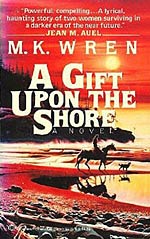
![]() HRO
HRO
1/30/2014
![]()
Earth is nearing the End - a deadly new strain of flu, cataclysmic natural disasters, overpopulation, famine, wars. Mary Hope, a 20-something aspiring author, flees the city hoping to find refuge and solace at the beach house she inherited from her aunt. But disaster is everywhere and Mary nearly dies when the bus she is traveling on is attacked by a gang of road rovers.
She is rescued by Rachel, a reclusive artist who gives Mary a home when she learns that her aunt's home is a derelict ruin that has been overtaken by squatters. Not long after, the End does come - in the form of a nuclear bomb. Over the next decade, Mary and Rachel struggle to survive in a devastated wasteland ravaged by nuclear winter. And together they embark on a project to preserve the thousands of books that Rachel owns because they believe that these may be the only books available for future generations (if there are any other survivors out there).
And then one day a stranger arrives at their home, a man from a fundamentalist Christian cult who has gone out in search of survivors. Though his beliefs clash with the more pagan nature-based spirituality that Rachel and Mary subscribe to, Mary falls in love with Luke and decides to abandon Rachel and return with Luke to the cult.
Mary is barely accepted by the 50ish members of the cult. When Rachel arrives a few months later, gravely wounded and needing medical attention, the cult leader brands her a witch and turns her away. Her eyes finally opened to the narrow-minded hate of the cult, Mary leaves with Rachel and attempts to nurse her back to health. When she fails she returns to Rachel's home, alone, and continues the book preservation project.
Several years later, members of the cult appear at Mary's home, seeking refuge after a fever has nearly wiped out their membership. Mary accepts them into her home but only after they are willing to accept the terms of agreement she sets. The cult's beliefs are still practiced, however, and their teachings are passed on to the next generation. Ultimately, there is a violent clash between their beliefs and Mary's, and both her life and the books she has preserved are endangered.
The story is told from two perspectives - the present, several years after the cult members arrive at Mary's home, and the past, which is the basis for a book that Mary is writing, The Chronicles of Rachel.
Mary's development through the novel is remarkably well done - from a naïve idealistic young woman to a resilient survivor; from a woman willing to sacrifice friendship and beliefs for a chance at a new beginning to an old woman who is wise and strong with a faith that she has handcrafted from all she has endured. The author shows Mary at each of these stages of her life, making the transitions believable, and truly makes her come alive upon the pages.
There is much to ponder in the story about spirituality and faith. Though on the surface the author seems to be claiming that there is something inherently wrong with Christianity as a whole (as evidenced by the beliefs and actions of the cult), I think the message is much broader than that. What is wrong is any religion that is narrow-minded, judgmental, and insular. When a belief system demands that it's followers adhere to a particular dogma without questioning it, it becomes something damaging rather than affirming.
As Mary says in the book, "When you can say 'I don't know' you've freed yourself to find the answer."
That truly is what this story is about - a quest for truth and faith and answers. Mary has to discover spirituality, rather than blindly accepting what was right for Rachel or what was taught by the cult. She has to seek the God that can answer the questions in her own heart, just as we all do. God is multifaceted with many interpretations.
And the books that Rachel and Mary preserve are an integral part of this search for truth, because in each book there are clues that lead to understanding. God is found not only in the Bible but in every volume of poetry, in every science textbook, in every novel.
Near the end of the book, someone is reading the poetry of Emily Dickinson and Mary comments, "I think of the reclusive Emily reaching across an ivy-covered stone wall more than a century and a half thick to cast wildflowers in his path."
Yes, for those who know how to see, one can discover God's beauty and grace in an Emily Dickinson poem.
In addition to all this profundity, the novel is quite simply a beautiful work of art - full of vivid description and raw emotion - and it is very well crafted and well written. Though it may not appeal to everyone, for the right reader it truly is a gift.